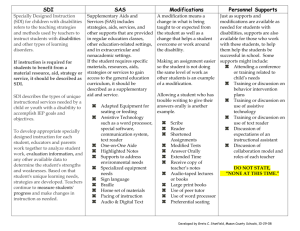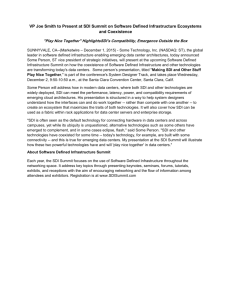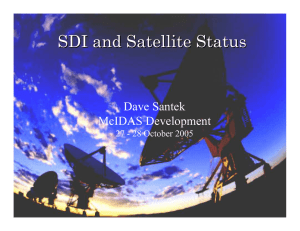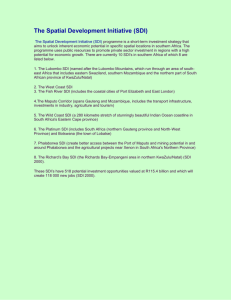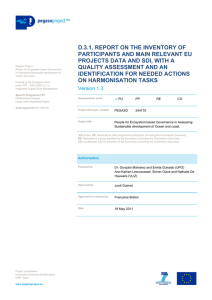Course Handbook PEGASO Spatial Data Infrastructure: training for geonode development
advertisement
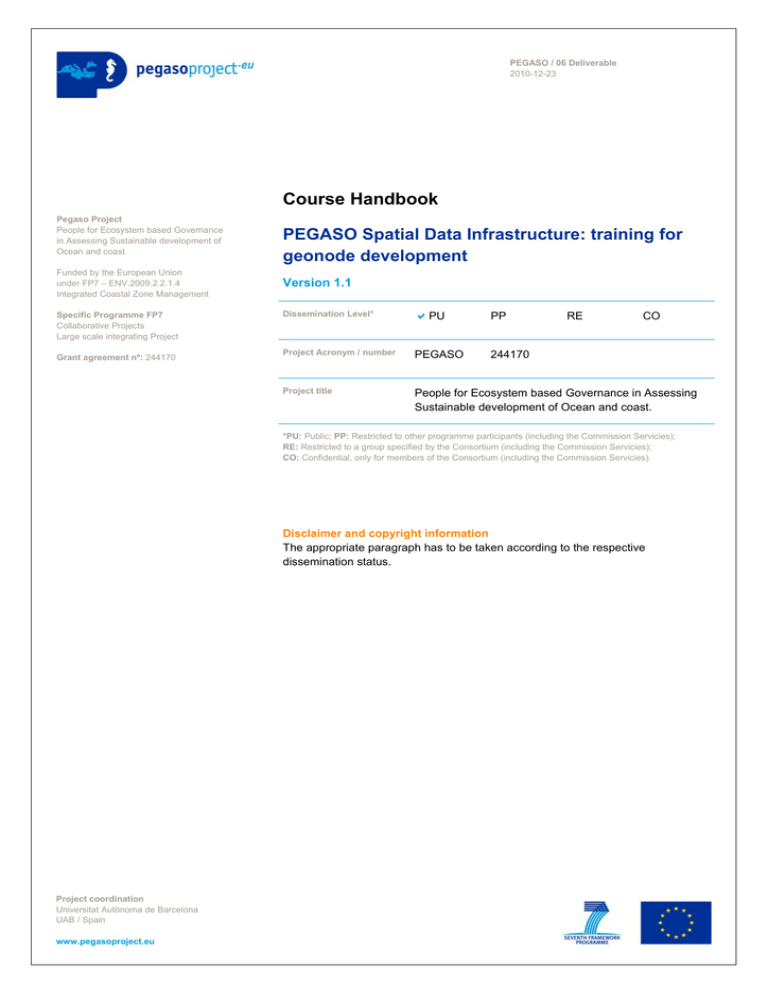
PEGASO / 06 Deliverable 2010-12-23 Course Handbook Pegaso Project People for Ecosystem based Governance in Assessing Sustainable development of Ocean and coast Funded by the European Union under FP7 – ENV.2009.2.2.1.4 Integrated Coastal Zone Management PEGASO Spatial Data Infrastructure: training for geonode development Version 1.1 Specific Programme FP7 Collaborative Projects Large scale integrating Project Dissemination Level* DPU PP Grant agreement nº: 244170 Project Acronym / number PEGASO 244170 Project title People for Ecosystem based Governance in Assessing Sustainable development of Ocean and coast. RE CO *PU: Public; PP: Restricted to other programme participants (including the Commission Servicies); RE: Restricted to a group specified by the Consortium (including the Commission Servicies); CO: Confidential, only for members of the Consortium (including the Commission Servicies). Disclaimer and copyright information The appropriate paragraph has to be taken according to the respective dissemination status. Project coordination Universitat Autònoma de Barcelona UAB / Spain www.pegasoproject.eu Course DESCRIPTION E-LEARNING: Web supplemented via Moodle E-Learning Platform TECHNICAL PREREQUISITE(S): Operating system: Windows. Windows XP recommended Linux (only for advanced users) CPU: Pentium 4 3Ghz RAM 1 GB MODULE COORDINATOR(S): Pablo Fernandez-Moniz (UPO) TEACHING STAFF RESPONSIBLE FOR COURSE DELIVERY: Pablo Fernandez-Moniz; Emllia Guisado; Gonzalo Malvarez; ADDITIONAL TRAINERS HOURS: Lectures 48 hrs (4h per week) Student Interaction 20 hrs Tutorials 12 hrs Independent study (including assessment) 90 hrs TOTAL EFFORT HOURS: 160 ACADEMIC SUBJECT: Geographic Information Technologies RATIONALE PEGASO's Description of Work document introduces the relevance and responsibility for the implementation of a Spatial Data Infrastructure. This task (3.2), consists in the development and PEGASO/BPR/Partner acronym editor/yymmdd-R-0.0 2 implementation of participants' geonodes for PEGASO's SDI. In order to build a geonode in each organisation, this short course aims at the development of capacities at a basic level for partners involved in the project to achieve the complete implementation of their geonodes. The provision of the E-learning based course is a first step in the capacity building plan in WP3 which will be completed in the hands on practical course in Oostende in October 2012. Course CONTENT AND STRUCTURE Module 1: Firsts steps on the SDI In this module a general introduction to the SDI, the methodology of the training course and the schedule is provided. An overview of the importance and role of SDI in Pegaso project will be analysed, focusing later on the use of the Inspire Directive in the European context. Further, the Pegaso data Harmonization guidelines will be discussed, and finally we will learn how to use OGC standards and Metadata specification. 1.1 Start up of the SDI training. From 16th April to 30th April. Week 1 ― SDI training starts up. Welcome to SDI training. ― SDI Importance Why using SDI. Importance of sharing our data and the contextualization with the Inspire directive ― Contextualization of the SDI in Pegaso project Usefulness of SDI in Pegaso Project. 1.2 Introduction to SDI and Geographic data. From 30th April to 14th May Week 2 ― Data harmonization in Pegaso Data structure in Pegaso. ― OGC and services What is OGC and its standards. Services available. Week 3 ― How to connect to SDI servers Installation of a desktop GIS and loading different services (WMS, WFC and WCS). How to use a light client. PEGASO/BPR/Partner acronym editor/yymmdd-R-0.0 3 ― Metadata in Geographic information Standards for geospatial metadata: the baseline ISO 19115; ISO 19139 for implementation of data metadata and the ISO 19119 for services metadata. Module 2: SDI in action. From 14th May to 29th June This module will be based on Geoserver functionality. To start, some issues about internet communication will be discussed to achieve knowledge about these tools. Further, a revision of the state of the art and availability of Map Servers software will be made, and finally we will learn how they work. The module will end with the provision of the capacity on how to set up the environment configuration and the variety of services on Geoserver: WMS, WFS and WCS. 2.1 Geoserver installation. Week 4 and 5 ― How does Geoserver work? Geoserver installation in our localhost 2.2 Setting up a WMS service. Week 6 and 7 ― Setting up a WMS service. 2.3 Setting up a WFS service. Week 7 and 8 ― Setting up a WFS service. 2.4 Setting up a WCS service. Week 9 and 10 ― Setting up a WCS service. Module 3: Integrating our SDI with all partners. Geonetwork. From 2nd July to 15th July Through this module we will demonstrate how to explore data on Geonetwork (the software used by the Pegaso SDI), to continue with the knowledge of how to fill metadata (create the metadata information needed for the SDI). Finally, a full training in how to connect and share our SDI will be provided. Week 11 and 12 ― Integrating our data on Geonetwork Methodology to share our data with other partners. ― Metadata Metadata in Geonetwork. PEGASO/BPR/Partner acronym editor/yymmdd-R-0.0 4 RECCOMENDED READING LIST ― Peter A. Burrough and Rachael A. McDonnell, 1998. Principles of Geographical Information Systems, Oxford University press ― Chamg, kang-tsung, 2002. Introduction to Geographic Information Systems. McGraw Hill Companies. ― Goodchild Michael F, Maguire David J., Longley Paul A., Rhind David W. 2002. Geographic Information Systems & Science. John Wiley & songs Ltd. NY. ― Coleman, D.J. and McLaughlin, J. 1998, Defining global geospatial data infrastructure (GGDI): components, stakeholders and interfaces, Geomatica, Canadian Institute of Geomatics. ― De Mers, Michael N. 1997. Fundamentals of geographic information systems. John Wiley & songs Ltd. NY. ― Geoserver manual: http://docs.geoserver.org/stable/en/user/ ― Geonetwork manual: http://geonetwork-opensource.org/_static/geonetwork24_eng.pdf SDI Training website and password Dear Guest, Welcome to the SDI training course which starts on 16th of April. Please click on the link to access the e-learning platform (moodle) that holds the course. Log in using the username and password provided. URL: http://sdipegaso.gstgis.com/ Username: user : guest_user Password: GuestUpo7 PEGASO/BPR/Partner acronym editor/yymmdd-R-0.0 5 CALENDAR MARCH APRIL 2012 L M X J V MAY 2012 S D L 1 2 9 3 4 5 6 7 8 7 M X J V S 1 2 3 4 5 8 9 10 11 12 10 11 12 13 14 15 14 15 16 17 18 19 16 17 18 19 20 21 22 21 22 23 24 25 26 23 24 25 26 27 28 29 28 29 30 31 30 JUNE 2012 L V S D 1 2 3 8 9 10 2 11 12 13 14 15 16 17 9 4 M 5 X 6 J 7 AUGUST 2012 JULY 2012 L M X J V S D L M 1 3 4 5 6 7 8 6 7 X J V S 1 2 3 4 8 9 10 11 10 11 12 13 14 15 13 14 15 16 17 18 18 19 20 21 22 23 24 16 17 18 19 20 21 22 20 21 22 23 24 25 25 26 27 28 29 30 23 24 25 26 27 28 29 27 28 29 30 31 30 31 Duration Modules Dates 8 Start up on the SDI training 16 April – 30 April 8 Introduction to SDI and Geographic data 30 April – 14 May SDI in action 14 May – 29 May 28 8 Operating with Geonetwork PEGASO/BPR/Partner acronym editor/yymmdd-R-0.0 2 July – 15 July 6
